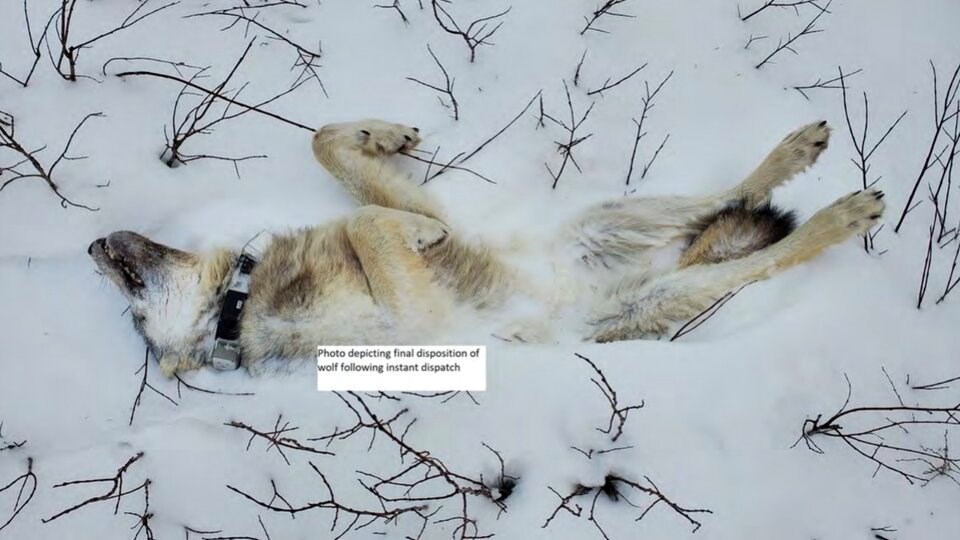A week after the B.C. government released , an environmental group is raising concerns veterinarian guidelines the province said it would adhere to are not being met.
Photos obtained in a freedom of information request and released by Pacific Wild this week show dozens of wolves shot through the abdomen, neck and head. Some of the photos, taken from the air, show tracks and the outlines of a collapsed wolf; others show close-up shots of the aftermath of a kill.
In an to the province, Pacific Wild’s director of conservation intelligence Bryce Casavant said the majority of shots were “not controlled head shots,” and in many cases, “are not forms of instantaneous kills which eliminate suffering.”
“Some of these pictures are pretty gruesome and pretty graphic. This is what this program is,” said Casavant in an interview.
“This isn’t veterinarians euthanizing some problem wolves.”
The photographs, which range from 2015 to 2022, document a province-run wolf call program meant to alleviate pressure on endangered caribou populations. In some cases, that's meant hiring sharpshooters to fire on wolves from helicopters.
A spokesperson for the Ministry of Water, Land and Resource Stewardship said the decision to kill wolves is based on science and sound wildlife management principles and "is not taken lightly."
“Without addressing high predation pressure from wolves, many caribou herds could face the risk of local extinction,” said the spokesperson.
Province says it's shooting wolves according to humane guidelines
In letter to Pacific Wild earlier this year, Deputy Minister, Ministry of Land, Water and Resource Stewardship Lori Halls said sharpshooters follow American Veterinary Medical Association’s Guidelines for the Euthanasia of Animals (2020).
On Thursday, a spokesperson for the ministry said those guidelines permit gunshots to the heart, as shown in many of the released photographs.
The province is committed to “animal welfare and the humaneness of our procedures in our predator reduction program,” the spokesperson said in an email.
Casavant says that contrary to Hall’s assertions, ministry staff haven't provided “a high level of shooter oversight on all occasions.”
In many cases, he said, the photos “run counter to long-standing ministry narratives.”
Lack of transparency leads to little public oversight
Casavant, who lost his job with the BC Conservation Officer Service after refusing to kill to orphaned bear cubs in 2015, said he has spent months trying to get the photos released.
In one case earlier this year, a senior official for the wolf cull program told a staffer at Pacific Wild Alliance it “will never release those photos because we know what you would do with them,” Casavant wrote in an last month.
But through the freedom of information process, the organization has recovered 46 photos. Casavant estimates there are 600 photos and 14 videos that still haven’t been released. A spokesperson for the ministry denied any photos were withheld as part of the freedom of information request.
Without a full body of photographic and documentary evidence — something the province’s wild cull permit requires for each kill — Casavant says it’s impossible to properly assess if the shooters carrying out the wolf kill are consistently following humane guidelines.
“If there’s 2,000 dead wolves, there should be 2,000 photographic records,” he said. “The government has run this program in relatively secrecy for many years.”
“This is the type of information that should be front and forward.”



